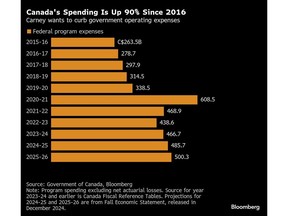
Article content
(Bloomberg) — Prime Minister Mark Carney said Canada will begin to use artificial intelligence “at scale” to make the government more productive, as his administration looks for ways to squeeze out cost savings in a time of economic pressure.
THIS CONTENT IS RESERVED FOR SUBSCRIBERS ONLY
Subscribe now to read the latest news in your city and across Canada.
- Exclusive articles from Barbara Shecter, Joe O'Connor, Gabriel Friedman, and others.
- Daily content from Financial Times, the world's leading global business publication.
- Unlimited online access to read articles from Financial Post, National Post and 15 news sites across Canada with one account.
- National Post ePaper, an electronic replica of the print edition to view on any device, share and comment on.
- Daily puzzles, including the New York Times Crossword.
SUBSCRIBE TO UNLOCK MORE ARTICLES
Subscribe now to read the latest news in your city and across Canada.
- Exclusive articles from Barbara Shecter, Joe O'Connor, Gabriel Friedman and others.
- Daily content from Financial Times, the world's leading global business publication.
- Unlimited online access to read articles from Financial Post, National Post and 15 news sites across Canada with one account.
- National Post ePaper, an electronic replica of the print edition to view on any device, share and comment on.
- Daily puzzles, including the New York Times Crossword.
REGISTER / SIGN IN TO UNLOCK MORE ARTICLES
Create an account or sign in to continue with your reading experience.
- Access articles from across Canada with one account.
- Share your thoughts and join the conversation in the comments.
- Enjoy additional articles per month.
- Get email updates from your favourite authors.
THIS ARTICLE IS FREE TO READ REGISTER TO UNLOCK.
Create an account or sign in to continue with your reading experience.
- Access articles from across Canada with one account
- Share your thoughts and join the conversation in the comments
- Enjoy additional articles per month
- Get email updates from your favourite authors
Sign In or Create an Account
or
Article content
Article content
Carney released a letter spelling out seven major priorities for his new cabinet, one of which is “spending less on government operations” to free up money for other priorities. The prime minister promised during the recent election campaign to rebuild Canada’s military and use the financial backing of the government to accelerate home construction, among other spending ideas.
Article content
Article content
The government won’t release a budget until the autumn months; usually it does so in March or April. That will allow more time to assess the economic effects of the trade war and figure out what new defense spending is needed, Carney told reporters Tuesday evening. The last new federal budget was in April 2024.
Article content
By signing up you consent to receive the above newsletter from Postmedia Network Inc.
Article content
The Canadian government’s total program expenses are expected to reach C$500 billion ($360 billion) this fiscal year, excluding debt charges, up from about C$260 billion in 2016. Carney has said operating expenses are growing too quickly and must be reined in, but has given few details on how he believes AI can be deployed in government operations.
Article content
He did, however, appoint Canada’s first minister of artificial intelligence — Evan Solomon, a former television broadcaster — as well as a minister of government transformation, Quebec lawmaker Joel Lightbound.
Article content
Economists are forecasting a budget deficit of 1.7% of gross domestic product this year, according to data compiled by Bloomberg. But the number is likely to be higher because of sluggish economic growth and the election pledges that Carney made. The Liberal Party’s platform projected a deficit of 2% of GDP for the fiscal year that ends next March.
Article content
Article content
“The delay of the budget is a bit concerning, as it raises questions about transparency and contributes to greater economic and fiscal uncertainty,” Josh Grundleger, a director at Fitch Ratings, said in an emailed statement.
Article content
Parliament will reopen next week, with King Charles III set to deliver what’s known as the throne speech on Tuesday, laying out the government’s priorities.
Article content
“It would be helpful for markets to have a clear sense of which aspects of the party platform will be implemented and what the ultimate impact will be on deficits, debt and the taxpayer,” said Fitch’s Grundleger.
Article content
Canada’s debt is rated AAA by S&P Global Ratings and Aaa by Moody’s, the highest ratings available from those agencies. Fitch downgraded the country to AA+ in June 2020.
Article content
“We hope to get more clarity on near-term priorities when the speech from the throne is introduced,” Travis Shaw, the lead analyst for Canada at Morningstar DBRS, said in an emailed statement.
Article content
Jennifer Love, an associate director at S&P Global Ratings, said Canada’s economic growth will remain “constrained” because of the tariff war launched by the US, its largest trading partner. However, “we continue to believe that Canada’s credit strength will persist even with lower growth and trade uncertainties,” she said.
Article content
Article content

.jpg) 5 hours ago
1
5 hours ago
1
 English (US)
English (US)